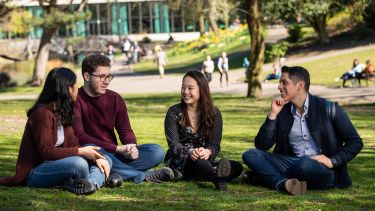Being a part of the University of Sheffield's legacy

Why did you decide to study a masters in the School of Sociological Studies, Politics and International relations at the University of Sheffield?
I was attracted to the University's reputation for excellence in research and teaching in this field. The school has a long history of producing highly skilled graduates with successful careers in politics, government, and the private sector. I wanted to be part of that legacy and learn from some of the best academics in the field.
Secondly, I was drawn to the diverse range of modules that the school offered. From international relations theory to international law in politics and democratisation, the school's curriculum covered a broad range of topics that allowed me to explore my interests and develop my skills in areas I was passionate about.
And finally, I heard and read fantastic reviews about the University of Sheffield Students Union and thought it would be a valuable part of my education. As it turned out, I was entirely right.
What has been your career path since graduating?
I returned to Russia and briefly worked for an international public/government relations company before finding a Deputy Press Secretary position with the British Embassy in Moscow. I applied for the job, thinking it would be a great opportunity to work for a couple of years, given my past media relations experience. However, I had no idea how much the world would change in 2014 when Russia invaded Ukraine for the first time. Due to this and other political events, I remained in this job for the next nine years, with my role evolving into strategic political communications rather than just media handling.
In 2022, Russia's regime decided to invade Ukraine again, accompanied by a nationwide campaign of smear and toxic propaganda against Russian citizens who voiced their opposition to the war or had links with foreign organisations. I continued working with the Embassy and the FCDO for several more months before deciding to change both my job and my country of residence.
Last September, I joined Zinc Network in London, which is a strategic communications and international development agency that helps governments, communities, businesses, and NGOs address some of the world's most complex social and geopolitical issues and deliver positive social change.
What did your role in the British embassy entail?
I started my job at the British Embassy as Deputy Press Secretary, basically being in charge of the Embassy's public communications online and in traditional media. It includes developing relations with the media, arranging interviews with the Ambassador or other HMG stakeholders (and or even the members of the Royal Family), supervising the Embassy's social media content, and keeping an eye on the media monitoring.
Together with my teammates and colleagues, we ensured that we were getting the best for UK-Russia relations – between the governments and the people of both countries. Unfortunately, since March 2014, when Russian armed forces invaded Crimea and Eastern Ukraine, the relationship between the countries has fallen into a negative downward spiral.
What about the new role at Zinc Network?
I work as a Project Director at Zinc Network, which is a strategic communication and international development agency that addresses complex social and geopolitical issues across multiple continents.
My responsibilities include utilising my expertise in political economy and strategic communications to shape the projects, ensuring that all risks are calculated, deliverables are outlined, and the main objective(s) are achieved. Zinc is a great multicultural company with some of the smartest people I have had the opportunity to work with.
How has your masters degree prepared you for these lines of work?
Critical thinking was one of the essential skills I gained during my studies at the University of Sheffield. Through engaging with complex theories and analysing case studies, I developed the ability to think critically and approach problems from different angles. This skill has been beneficial in my current role, where I often need to analyse complex issues and develop innovative solutions to problems.
I also gained a deep understanding of the principles of diplomacy and international development during my studies. This knowledge has been essential in my work at the FCDO and Zinc Network, where I have been working on projects that aim to promote sustainable development and build a more stable and secure world.
Specifically, I took several modules at the University of Sheffield that have been particularly relevant to my work career and have been crucial in my work on projects related to governance and democratic reforms.
What advice would you give to any international students thinking about studying in the UK?
Studying in the UK is a fantastic opportunity I encourage everyone to take advantage of! It's not just about learning new things but also about connecting with people worldwide.
When you study abroad, you experience new cultures and ways of life that can broaden your horizons. You'll learn new ways of thinking and see things from a different perspective. And you'll also get to meet amazing people from all over the world. These connections can lead to lifelong friendships and help you build a global network that can benefit you both personally and professionally.
Studying abroad can be scary - it's a big step to take. But it's also an incredibly rewarding one. You'll learn so much about yourself and the world around you and come away from the experience with a new sense of confidence and independence.
So if you're thinking about studying abroad, go for it! It might be scary at first, but it's an opportunity that you won't regret. You'll gain so much from the experience and come away with memories that will last a lifetime.

International postgraduate taught scholarships
We're offering scholarships worth up to £3,000 to international students joining the University to study a taught masters programme in September 2026.

